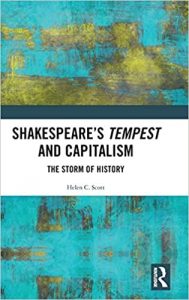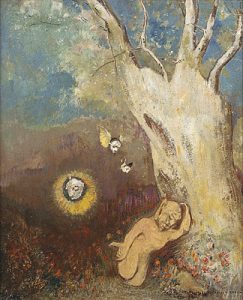Podcast: Play in new window | Download (Duration: 59:00 — 44.0MB)
 We open with the first movement of Beethoven’s “Tempest,” or Piano Sonata No. 17 in D minor, composed in 1802, performed here by Glen Gould on March 19, 1967 on the television program “Music For a Sunday Afternoon.”
We open with the first movement of Beethoven’s “Tempest,” or Piano Sonata No. 17 in D minor, composed in 1802, performed here by Glen Gould on March 19, 1967 on the television program “Music For a Sunday Afternoon.”
We read ourselves in Shakespeare’s Tempest – not only can we chart our sociological course by surveying productions of the play, but we, each of us, expose our notions of gender, politics, and race, when we open our mouths in interpretation. I certainly do.
The play upends or reverses our understanding time and again. A shipwreck that is not a shipwreck restores to order a broken ship of state. But what is revealed by the main action of the play is the rot at the core of that ship. It is made to forever founder.
This play gives us the great sorcerer, or White Mage, Prospero, who through the power of his magic or art (a kind of burgeoning science) achieves one such “restoration” of political and worldly power. But it’s the nature of that “art” that must be called into question and challenged. That’s our task today.
GUEST
 Our guest for the hour is Helen C. Scott, associate professor in the department of English at the University of Vermont, and author of Shakespeare’s Tempest and Capitalism: The Storm of History, published by Routledge.
Our guest for the hour is Helen C. Scott, associate professor in the department of English at the University of Vermont, and author of Shakespeare’s Tempest and Capitalism: The Storm of History, published by Routledge.
Scott’s book tracks the way productions of the play reveal the politics of each successive age – how to some Prospero is the benevolent mage of the liberal arts and yet to others he is a colonizer and slave master; a philosopher king and harbinger of scientific progress who is revealed to be nothing but the thief of natural resources and labor power.
Through this short play we can interrogate so many ideas: the nature and order or worldly power and those who dominate and those who are oppressed; enslavement, dispossession, torture, the right of conquest and imperial projects; the application of science, and the use of bodies as productive labor and reproductive labor. And finally we are confronted with all of life’s impermanence and how it drives humanity toward meaning.

Odilon Redon. 1895-1900
Full fathom five thy father lies;
Of his bones are coral made;
Those are pearls that were his eyes:
Nothing of him that doth fade
But doth suffer a sea-change
Into something rich and strange.
RELATED
Full Text of The Tempest
Such Stuff: Henry Woronicz on The Tempest
On the Concept of History (1940) by Walter Benjamin
AUDIO CLIPS
Marianne Faithfull – “Full Fathom Five” (Ariel)
Naxos Production of The Tempest (Boatswain, Prospero, Miranda, Caliban)
George Schaefer Showcase Theatre presentation of The Tempest (Caliban)
MUSIC
Beethoven – “Piano Sonata No. 17 in D minor, Op. 31, No. 2,” performed by Glenn Gould
Miles Davies Quintet – “The Sorcerer”
Albert Ayler – “The Wizard”
Charles Mingus – “Haitian Fight Song”
CREDITS
Producer & Host: Doug Storm
Executive Producer: Kade Young
 WFHB Bloomington Community Radio
WFHB Bloomington Community Radio


